Who would win a rematch between Joe Biden and Donald Trump if the election were held today?
“Biden, probably,” a fool might say.
Believing that he’d prevail isn’t the foolish part. I agree that Biden would be more likely than not to win, although he’s no better than a 60/40 favorite. And 40 percent odds come through all the time.
The foolish part is giving a moment’s thought to a pointless question. “Who cares? The election won’t be held today” is the correct answer.
By the time Americans vote in November 2024, I suspect the president will be an underdog. Not a heavy underdog—there’s no such thing as a Democrat who’d lose decisively to Trump—but enough of one to make the former guy a slight favorite in battleground states.
This is on my mind because of David Frum’s uncharacteristically optimistic piece in The Atlantic, “The Coming Biden Blowout.”
Combine abortion baggage with low unemployment plus the fact that Trump’s brand of politics makes most Americans retch and you have the makings of “a deep, nasty defeat” for Republicans in 2024, he argues. That’s notable coming from someone who’s never been sanguine about the threat posed by the populist pathologies that Trump exemplifies. Anti-Trump conservatives like Frum have grown cynical, rightly and righteously so, about what this country might tolerate in a president after eight years of staring into the abyss. It’s shocking to find him, of all people, encouraging readers to relax, we’ve got this.
I do not think we’ve got this.
This isn’t my Never Trump PTSD talking.
Before we go through some of the recent polling, I ask you to bear in mind that things are going relatively well for Biden at the moment. The economy is still adding hundreds of thousands of jobs each month. Inflation isn’t what it was last year. The country isn’t at war. Congress hasn’t (yet) defaulted on the national debt. A popular backlash to the end of Roe v. Wade continues to bite Republicans.
There are no major disasters tormenting the country that might easily explain deep misgivings about the president among the electorate. Even the closest thing to one, the border crisis, has seen some modest improvement lately.
Here, then, is what the numbers look like for Joe Biden when things are “good.”
His job approval in the RealClearPolitics average stands at 42.9 percent, in line with where it’s been since last fall, give or take a point or so. That’s slightly lower than Trump’s job approval was on this date in 2019. “Generally, presidents get pretty close to their approval rating in voting support” on Election Day, Ruy Teixeira noted yesterday. “The last three incumbent presidents (W. Bush, Obama, Trump) got only 1-2 points higher support than their approval rating at the time of the election.” The last time Biden’s average approval touched 45 percent was October 2021.
On key issues, he routinely polls below 40 percent. Today at RCP he stands at 37.8 percent approval on the economy, 34.8 percent on immigration, and 34.0 percent on inflation. The only major issue on which more voters approve of his performance than disapprove is his handling of COVID. Which, by November 2024, is unlikely to qualify as “major.”
He’s viewed more favorably than Trump by only a few points, scoring 41.3 percent to Trump’s 39.0 percent. Biden’s vice president, who’ll feature heavily in GOP campaign ads as likely to serve out his second term, is below Trump at 38.5 percent favorability. In 2024 head-to-head polling, Trump leads Biden by an average of half a point.
Meanwhile, here’s what the six-year trend looks like when Americans are asked how they feel about the direction of the country.
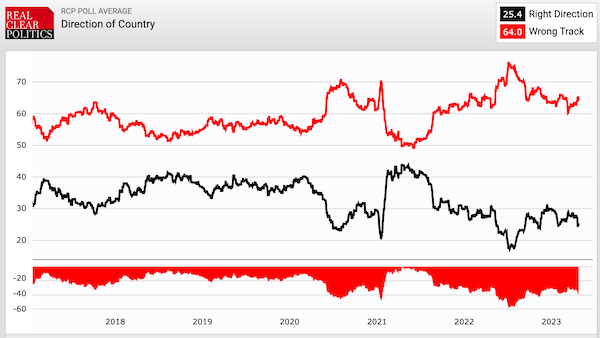
For most of Trump’s presidency prior to the start of the pandemic, the share who believed America was moving in the right direction hovered between 35 and 40 percent. Since the Afghanistan withdrawal fiasco in the summer of 2021, that share has hovered between 25 and 30 percent during Biden’s presidency.
Yesterday Gallup found that Biden’s job approval had fallen to 37 percent, his worst number to date. His quarterly approval rating stands at 39.7 percent, the second-worst showing in the ninth quarter of any president’s term since World War II. Trump’s rating in the same quarter of his own presidency was 41.6 percent by comparison.
It would be one thing, perhaps, if Biden enjoyed fervent support from his own base despite his dismal approval across the rest of the electorate. That’s how Trump nearly won reelection in 2020: His job approval sat at around 43 percent for much of his presidency but that 43 percent consisted mostly of supporters who would walk through fire to cast a ballot for him. He turned them out in droves, enthusiastically.
That is not the situation in which Joe Biden finds himself, the Washington Post notes.
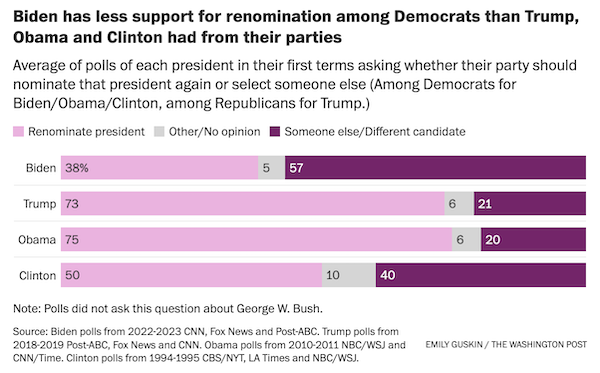
An NBC poll published a few days ago found more public resistance to Biden running again than to Trump running. Sixty percent opposed having the reigning Republican nominee back on the ballot. Seventy percent said so of the reigning Democratic nominee.
Which brings us to the latest primary polling. Two different surveys released this week found anti-vax weirdo Robert F. Kennedy Jr. pulling a surprisingly large share of the Democratic vote from Biden. Fox News had Kennedy at 19 percent against the president while Emerson saw him at 21 percent. The same Emerson poll had Ron DeSantis winning just 16 percent of the Republican primary vote, meaning that Biden’s token opponent is drawing more support from him than the twice-elected governor of Florida is drawing from Trump.
There are sound reasons to believe Kennedy’s numbers will collapse but the bottom line is inescapable. Biden might emerge from a noncompetitive primary looking weaker than Trump will after emerging from a bitterly contested one. The sitting president, who got the most votes in American history three years ago, may struggle to overcome ambivalence among his base to a greater degree than the guy on the other side who’s likely to be facing two or three indictments by Election Day.
If this is the state of the race today, when things are “good” for Democrats, what will it be in November 2024 when things are likely to be less good?
The difficulty in puzzling out whether Biden or Trump should be considered the favorite is that a rematch will present Americans with something we’ve never seen before, a contest between two people who are both very clearly losing their marbles in plain sight.
Who should rightly be considered the stronger candidate between a “deranged hobo” and an octogenarian who seems mostly lucid on good days and something less than “mostly” at other times?
With nearly any other Democrat as nominee, the 2024 campaign would be a pure “referendum election” asking voters whether they believe a twice-impeached coup-plotter who sounds nuttier by the day is fit for office. Republicans would lose that referendum. With Biden as the nominee, though, the 2024 race becomes a “choice election.” Who’s more fit for office, the twice-impeached coup-plotter who maintains a decent energy level for a man his age or a senescent geriatric whose reelection would likely end in a Kamala Harris presidency?
If Americans had to answer that question today, I think they’d reluctantly take Grandpa Joe. But who will they take when Joe Biden is 18 months older?
A few days ago the New York Post published photos showing that the president had advance notice of a question asked by the Los Angeles Times at a recent press conference. Traditionally that would be framed by the right as a media scandal: Why are reporters warning their friends in the Democratic Party which subjects might be broached during a Q&A?
In this case, the Post presented it as raising further questions about Biden’s “mental acuity.” Why does Biden need a tipoff to help him answer basic policy questions? Why does he need a written “cheat sheet” from his staff instructing him on matters as rudimentary as when to sit down?
Trump is already using the president’s feebleness to comic effect, with plenty more to come.
Even “moderate” Republican candidates have taken to speculating aloud that Biden will expire before his second term does.
The president’s age is mostly a preoccupation of right-wing media, but big media has begun to pay more attention as he moves toward another run. On Friday morning Axios published this eyebrow-raiser about Biden’s schedule, which the Washington Free Beacon cheekily described as evidence that the president is already “semi-retired.”
Biden's close advisers say he's mentally sharp. But even some of them concede his age has diminished his energy, significantly limiting his schedule.
- Many White House officials say they're amazed at Biden's stamina — often adding the caveat: "for his age.”
- Some White House officials say it's difficult to schedule public or private events with the president in the morning, in the evening, or on weekends: The vast majority of Biden’s public events happen on weekdays, between 10 a.m. and 4 p.m.
In 2020 the Biden campaign’s penchant of calling a “lid” on events for the day at suspiciously early hours was a frequent subject of Republican criticism. The pandemic provided a convenient excuse for that, one that won’t be available next year. If Trump is doing three events per day next fall while Biden is doing, say, three per week, what might swing voters deduce from that disparity?
Before you answer, consider that Americans in all three partisan groups are already more likely than not to believe Biden is too old to be president.
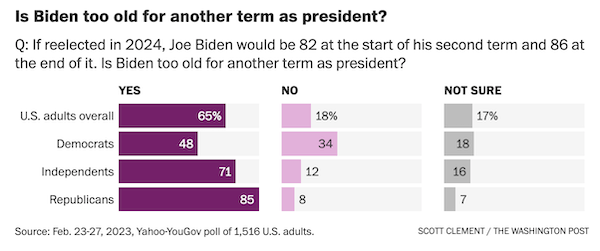
Eighteen months out from Election Day, the share of his own party that fears he’s too old to serve is already a near-majority. Those numbers will move in only one direction over time, just as Biden’s age will.
Were he to suffer a health crisis during the campaign, even one from which he fully recovers, doubts about his capacity might reach unelectable levels. Imagine him catching the flu, disappearing from view for a week, then reemerging seemingly in good health. Just the thought that the country might have quietly come thisclose behind closed doors to President Kamala Harris might be enough to wreck his chances.
Trump is different. His derangement will get worse as well but it’s possible—possible, not likely—that his advisers will convince him for strategic reasons to avoid certain unhelpful topics that tend to show it off. (Ix-nay on the utsch-pay.) With great effort and uncharacteristic discipline, Trump could pitch himself to persuadable voters as less crazy than they might have heard. There’s nothing Biden can do to pitch himself as less old and more focused.
And so, as time passes and Election Day approaches, the answer to the question of “Who’s more mentally fit for office?” might change.
Even if Biden managed somehow not to decline further in energy or acuity, which no one expects, his chance of reelection probably hinges on America not suffering any crises over the 18 next months. Which no one expects.
Many experts foresee a recession this year. The Ukraine war in which Biden has invested so heavily has been a stalemate for months and could drag on that way for months to come. China might make a move on Taiwan, drawing America into war and potentially crippling the economy. Debt ceiling negotiations between the parties this summer could fail, triggering a default with similarly crippling effects. The Saudis, eager for Trump’s return, could slow oil production to drive up the price of gas in the U.S. before Americans vote. House Republicans’ many investigations of Biden and his family could, against all odds, bear fruit.
Biden has no margin for error, medically or politically. What are the odds that there will in fact be no errors in the span of a year and a half?
Not good, I fear. Doesn’t that make him the underdog?
Maybe not. I’m open to the idea that Trump is so preposterously toxic among the general electorate at this stage of his deterioration that Biden will defeat him even if he’s drooling on himself by Election Day 2024. This will be the ultimate “lesser of two evils” election, it seems, and Donald Trump isn’t easily out-eviled.
Besides, things are likely to get worse over time for him too. There will be more indictments, probably. There will be further insane social media posts and fascistic policy proposals offered, certainly. Plenty of swing voters exasperated with Biden’s decline will resolve to give Trump a second look over the next 18 months only to find themselves backpedaling in horror once they do.
Consider a few hard realities, though.
First, despite Biden’s lopsided victory in the popular vote, the outcome of the 2020 election was closely run. If Trump had flipped just 44,000 votes in a few key states, he’d be president today. The gap he needs to close is smaller than you may think.
Second, Biden can’t run this time as a generic Democrat the way he did three years ago, turning the 2020 race into a pure referendum on Trump. An up-or-down vote on the Trump presidency proved to be enough to consolidate leftist support behind the Democratic nominee, bring swing voters into Biden’s column, and cause some center-right voters to withhold their votes from the Republican.
No more. Biden has his own record as president to defend this time and some progressives aren’t thrilled with it. When Alexandria Ocasio-Cortez was invited to endorse the president for reelection in an interview last weekend, she politely declined. Some swing voters have doubtless also concluded that inflation during the Biden presidency is more of a hardship than anything they endured under Trump. And some center-right voters, having had quite enough of Democratic policies since 2021, will decide that a second Trump is worth the risk to avert more of them.
Third, as strange as it may seem to Dispatch readers (and writers) that some persuadable American voters might be nostalgic for the Trump years, it’s assuredly true. A person who doesn’t follow politics closely but feels keenly when economic conditions are good and when they aren’t might pine for the roaring economy of the pre-pandemic phase of Trump’s presidency, having rolled the dice once before on Biden in 2020 and come to regret it. A recession this year or next will make that nostalgia that much more potent, needless to say. If you doubt it, I refer you again to the data above on whether Americans feel the country is moving in the right direction.
Finally, there’s an asymmetry between Biden and Trump that favors the Republican. Namely, Trump’s campaign has a purpose.
What you think that purpose is depends on how cynical you are about right-wing populism. Garden-variety Republicans would describe it as tightening the border and ending runaway spending. Trump enthusiasts would describe it as ending wokeness and defeating the deep state. I would describe it as mainstreaming authoritarianism, as returning a coup-plotter to office after the coup attempt was exposed would serve as supreme proof that there’s no longer any political downside in America for assaulting basic civic institutions.
One way or another, Trump’s voters will know what they’re voting for. Whereas Biden’s voters will be voting for … what? Nothing grander, really, than “defeating MAGA”?
That was enough in 2020, when the country was hurting from a pandemic over which Trump presided. I’m skeptical that it’ll be enough in 2024.
Although “defeating MAGA and strict abortion bans” might do the trick, I suppose.
“The contest between Biden and Trumpism is less Democrat versus Republican or liberal versus conservative than it is between an essentially moral vision and an essentially amoral one, a contest between decency and its opposite,” David Brooks writes today. Leaving aside how “moral” the modern Democratic vision is, it’s certainly true that Trump’s is an amoral—or immoral—one. I’m just not convinced that that’s enough of a handicap in America 2023 to make him an underdog.
I think he’s the favorite, narrowly. Happy weekend.
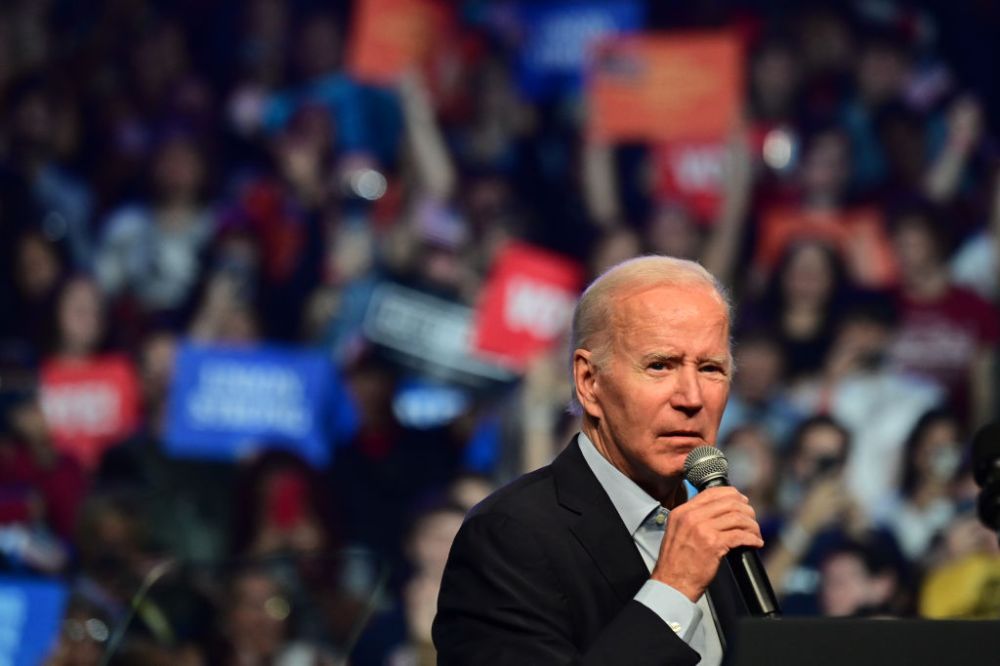





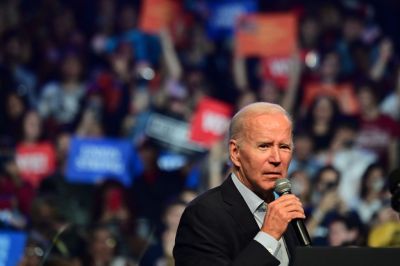
Please note that we at The Dispatch hold ourselves, our work, and our commenters to a higher standard than other places on the internet. We welcome comments that foster genuine debate or discussion—including comments critical of us or our work—but responses that include ad hominem attacks on fellow Dispatch members or are intended to stoke fear and anger may be moderated.
With your membership, you only have the ability to comment on The Morning Dispatch articles. Consider upgrading to join the conversation everywhere.